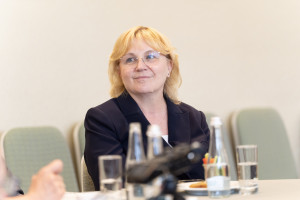Mortality Rates for Endometrial Cancer Rise: "Losses Cannot Be Made Up for Incorrect Classification"

- Endometrial cancer is the most common gynecological cancer. It is diagnosed in over 6,000 women in Poland every year. It is estimated that the number of cases will increase
- In recent years, there has been a disturbing trend of increasing mortality among patients with endometrial cancer. This is particularly true for patients aged 65+.
- One of the reasons may be the underestimation of the clinical stage of the disease at the beginning of its treatment. Mistakes made at the very beginning, i.e. at the stage of diagnostics and qualification for therapy, cannot be made up for and will affect the prognosis. This shows how important the choice of the hospital in which we want to be treated is.
- The greatest benefit comes to patients who are treated from the very beginning in centers with extensive experience in the treatment of this cancer, with all available methods, as well as a multidisciplinary team that will properly plan the therapy.
- Endometrial cancer is currently the most common gynecological cancer. The latest data from the National Cancer Registry concern the year 2022 - then almost 6 thousand women fell ill. However, this number will grow, the main reason for which is the modern lifestyle - says Dr. Anna Dańska-Bidzińska from the Clinic of Gynecological Oncology of the National Institute of Oncology - State Research Institute in Warsaw.
As he explains, most hormone-dependent endometrial cancers diagnosed in postmenopausal patients, i.e. aged 50+-60+, are associated with the growing obesity epidemic . In addition, excess body weight is often accompanied by diabetes, and elevated glucose levels can also have an adverse effect on estrogen metabolism, which contributes to the development of this cancer.
- The number of cases of endometrial cancers, previously referred to as type 2 of this cancer, unrelated to hormones, adipose tissue, or lifestyle, is also increasing . They are more aggressive and are usually observed in older women aged 70+. And because life expectancy is systematically increasing, we are detecting more of these types of cancers than in previous years - the expert points out.
- The third group, when it comes to the causes of the disease, are hereditary cancers . This is a small percentage, around 5 percent , but still noticeable. Hereditary endometrial cancers are most often diagnosed in young women with a family history of adenocarcinomas of various organs (Lynch syndrome II) - she adds.
These errors will affect the prognosisAs Dr. Dańska-Bidzińska says, the mortality rate in uterine cancer has increased in recent years, especially in the group of patients over 65 years of age. This applies not only to Poland, but also to other countries.
- What is the reason for this? First of all, more aggressive endometrial cancers occurring in older patients are being diagnosed more often than before - he notes.
- Secondly , the cause may be the underestimation of the clinical stage of the disease at the beginning of its treatment . This has been the case in recent years, and now we hope that the situation will change with the strengthening of the National Oncology Network - the specialist emphasizes.T
He explains that some patients were admitted to hospitals that had no experience in treating uterine cancer. Immediately after diagnosis, they were offered surgery, without diagnostic imaging, which allows for an initial determination of the clinical stage of the cancer. As a result, patients were operated on inadequately.
The choice of hospital matters- This happens all the time, as evidenced by the stories of many patients who come to our clinic. Meanwhile, in cancer, the most important thing is the beginning, i.e. qualification for treatment, which takes place after going through all diagnostic procedures: histopathological, molecular and imaging. Any negligence or error made at this stage resulting in qualification for inappropriate therapy means a loss that cannot be made up for. It will affect the prognosis - emphasizes Dr. Dańska-Bidzińska.
- This shows how important the experience that a hospital can demonstrate in treating uterine cancer is . Especially since we currently have a whole range of treatment methods at our disposal. The greatest benefits accrue to patients treated from the very beginning in centers that have each of these methods, as well as a multidisciplinary team that will properly plan the therapy - he adds.
As indicated, in this context, mortality statistics for uterine cancer may be additionally influenced by the reluctance of older patients with aggressive endometrial cancer and multiple morbidities to undergo treatment in centers distant from their place of residence. Meanwhile, the nearest hospitals do not always turn out to be the best choice.
- The reason for the increase in mortality may also be the fact that in recent years the indications for adjuvant radiotherapy have been limited - such were the recommendations for the procedure . Currently, because our knowledge of endometrial cancer has deepened significantly, in some cases we still limit adjuvant treatment, but in some cases we do the opposite, expanding it . As you can see, there are many reasons for this disturbing trend and the picture is complicated - adds the expert.
Copyrighted material - reprint rules are specified in the regulations .
rynekzdrowia












